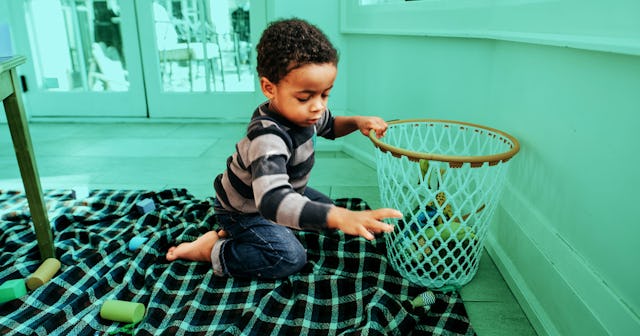We Need To Teach Kids To Take Care Of Their Belongings — Here's How

In today’s edition of “Tell Me What I Already Know About Parenting” I just want to say…. kids cost too much damn money! From toys to chargers, I feel like I am in a constant loop of figuring out who broke something and why. And as someone who regularly works with brands, I’m starting to wonder if I’m doing my children a disservice by letting them keep so many toys. How could I possibly be teaching them the value of their things if they get something new ALL THE TIME? Because honestly, they break so much shit that I’m starting to wonder if they’re just doing it on purpose. That was before I asked other moms and realized many of us are wondering the same thing.
While material possessions aren’t everything, there’s nothing wrong with having stuff. I’m not doing my kids a disservice by letting them have nice things — I’m just driving myself crazy by not teaching them how to take care of the things they get. Until they learn to become responsible for their own property (and respect others), they can have everything or nothing and it would not matter. Here are some of the steps that I have taken to teach my kids to appreciate (and care for) their belongings:
Learn the difference between destructive behavior and what’s “normal.”
This was the first and most important step in figuring out what the hell is going on in my house. Destroying property, for some children, is a way of coping with frustration. I already knew and confirmed that my kids aren’t breaking things because they are angry or frustrated. They are breaking things because they are kids and they’re clumsy AF. Also, at seven and four years old, they have no idea what the value of anything is. Thus, taking care of the things that I work hard to get them are relatively low on their list of priorities. Especially when said objects are easily replaced.
Allow children to feel natural consequences.
This was where I was seriously falling short. I used to be the type of parent to quickly replace my children’s broken toys in the name of “mommy’s mental health”. My oldest son broke his first iPad screen so many times that the last time it was repaired it never returned to normal working condition. It took me a little too long to realize that by not letting my children feel the natural consequences of not caring for their property, they were a lot more careless with it. Now, you break it, you wait. This isn’t an immediate need. The same way money isn’t falling out of the sky into my lap (I wish), new and/or fixed things aren’t just appearing in our house either. Needless to say, we’ve had a broken Nintendo Switch control for months.
Evgeniia Siiankovskaia/Getty
Lead by example.
How can I expect my kids not to be a hot mess, if I am? I’m not walking around the house breaking everything in sight, but I can definitely work on my organization. I can’t expect my children to put their things away so they aren’t stepped on, if they’re tripping over my stuff to get to theirs. Having a place for everything and actually keeping things in place helps minimize these types of accidents. It also helps minimize anxiety which is a huge bonus.
Buy fewer things.
This probably sounds completely contradictory to what I said earlier, but I can’t help but include it because it obviously makes sense. Minimizing the amount of “stuff” your kids have is a good way for them to learn to take care of their things for many reasons. It also helps with the understanding that they cannot have everything and therefore need to take care of what they do have.
Limit when they can get new things.
For most younger children, money means nothing. And if for some reason the idea of buying less things doesn’t fit your lifestyle (in which case you may need to be Kondo’d), then limiting when you buy new things is another idea. You can also implement a reward system that lines up with chores. This helps your child learn the value of their time, and they are less likely to destroy things they actually had to work for.
Managing my expectations has been key when it comes to dealing with situations that are developmental. Yes, my four-year-old and seven-year-old grasp concepts differently than each other and neither of them understand things as well as adults. But that doesn’t exempt them from learning and it’s not an excuse for them to be destructive. In teaching them to take care of their belongings, I am giving myself back a little bit of my sanity. And we are all becoming better for it.
This article was originally published on